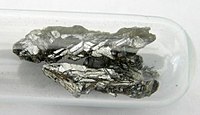
Photo from wikipedia
Although bioaugmentation is known as effective and environmentally friendly method increasing removal of hydrocarbons from oil-contaminated soil, it sometimes fails in soil restoration and disturbs the ecological state of soil.… Click to show full abstract
Although bioaugmentation is known as effective and environmentally friendly method increasing removal of hydrocarbons from oil-contaminated soil, it sometimes fails in soil restoration and disturbs the ecological state of soil. We studied possible scenarios of the introduction of oil-degrading bacteria into oil-contaminated podzolic soil assessing the environmental safety of different bacterial preparations in a long-term field experiment. Integral indicators characterizing the state of biocenosis included biological activity of soil and aboveground biomass of grasses. It has been established that bacterial preparations can have both positive and negative effects on the ecological state of soil and oil biodegradation. Of the five bacterial preparations studied, one had a pronounced positive effect on soil biological activity and oil mineralization processes. Two preparations did not accelerate oil biodegradation and were characterized by a weaker positive effect or even a lack of influence. Two more bacterial preparations had a significant negative impact on soil biological properties. These preparations slowed oil mineralization in soil. Both positive and negative effects of bacterial preparations were observed only during the first two years after their application. All preparations were not effective during the latter stages of long-term remediation processes. The results indicate that successful application of bioaugmentation for the restoration of oil-contaminated soil requires testing of environmental safety of bacterial preparations in a long-term field experiments prior to any treatment processes.
Journal Title: Environmental Geochemistry and Health
Year Published: 2020
Link to full text (if available)
Share on Social Media: Sign Up to like & get
recommendations!